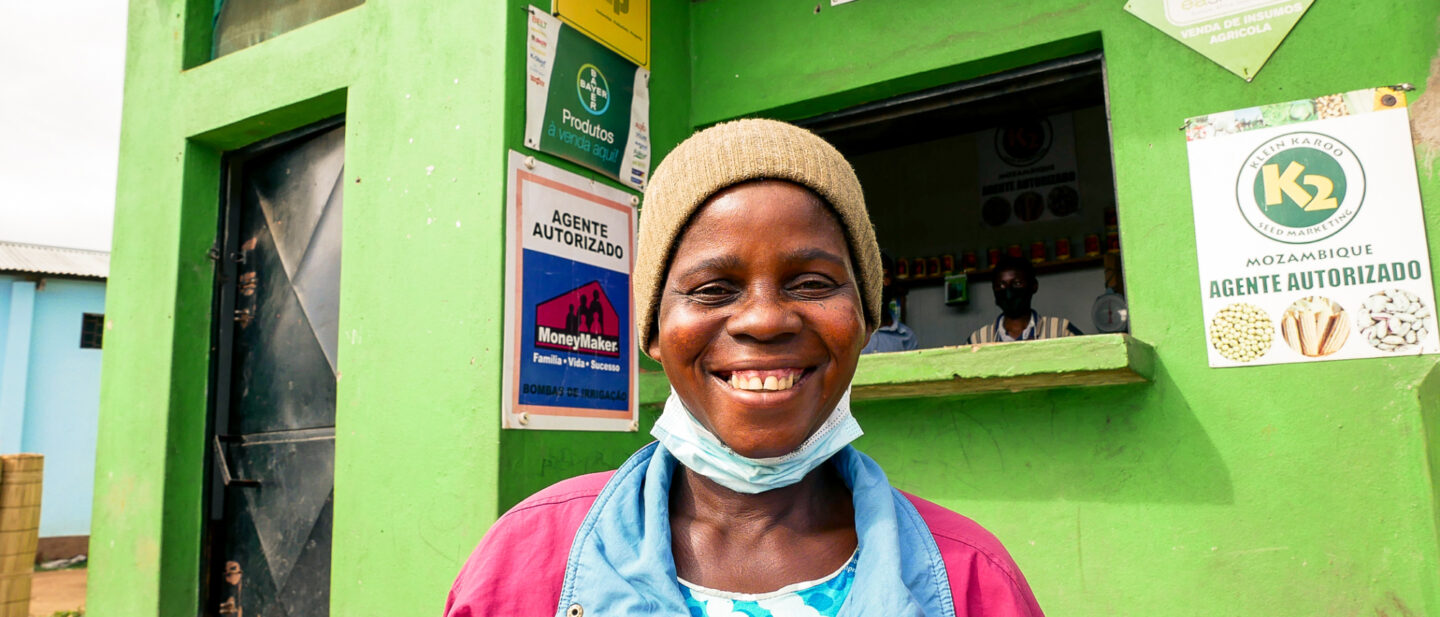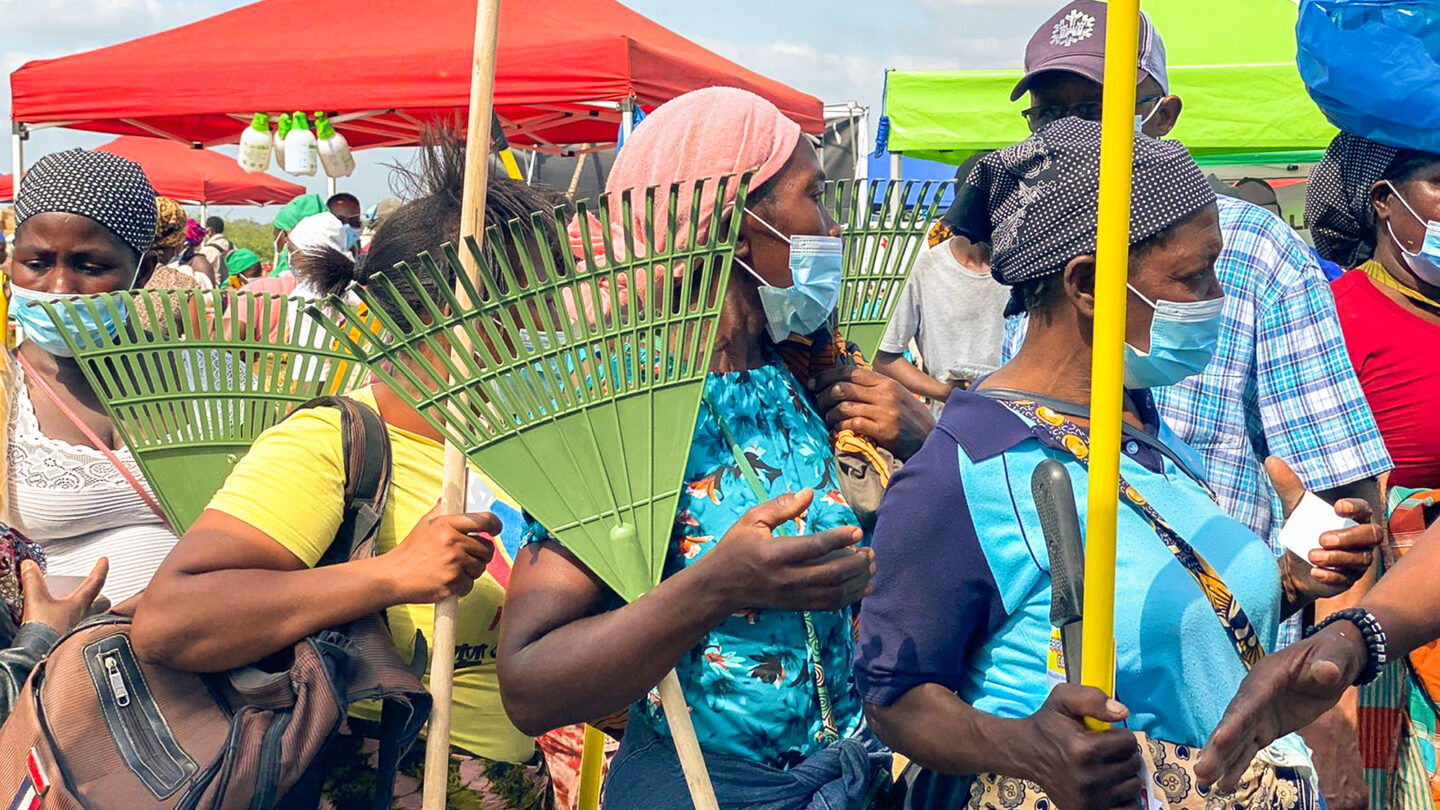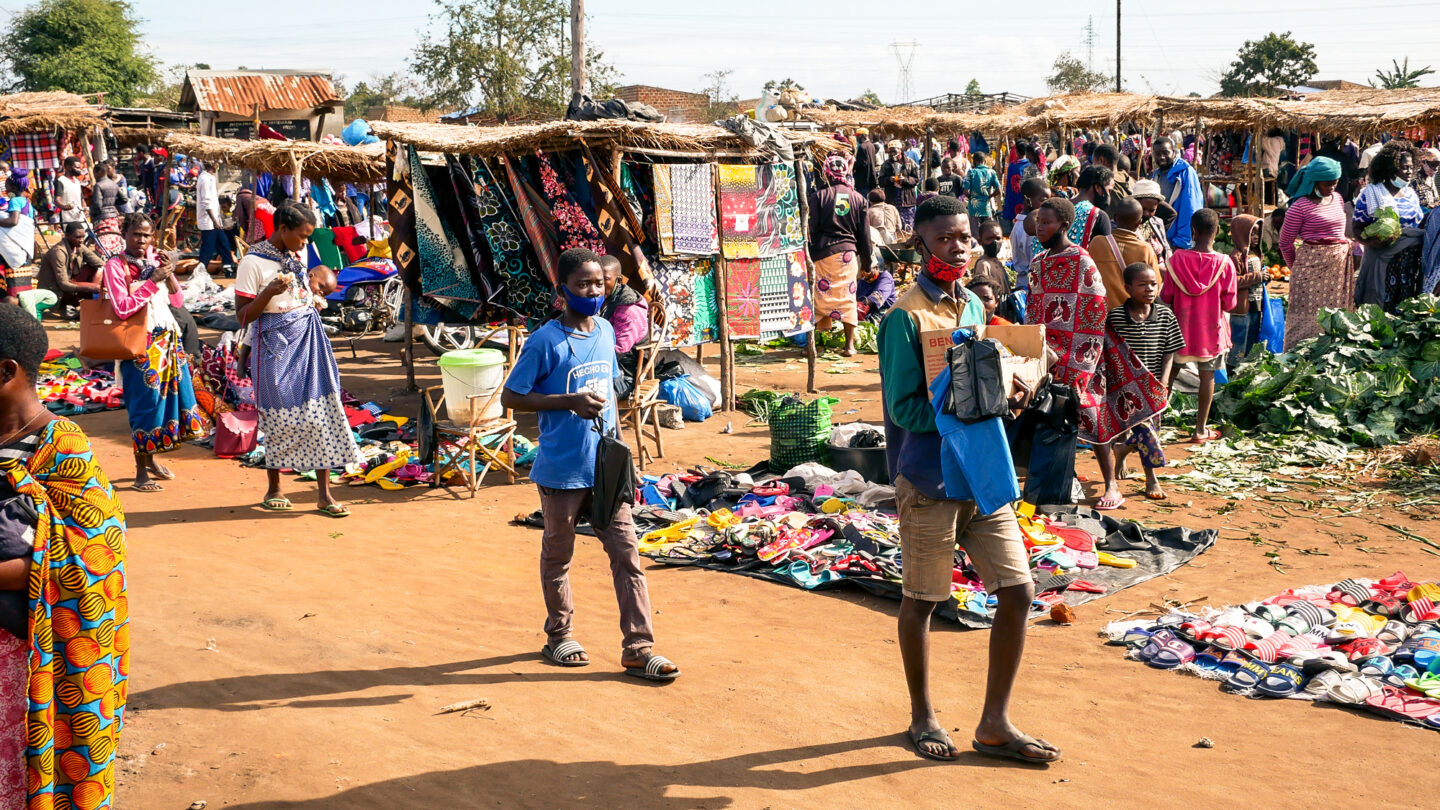Change Agents Power Recovering Mozambican Farmers
iDE Adapted To Combat Natural Disasters and Socio-Economic Disruptions
Flora Mostiço is a change agent in her Mozambican community. At her market store in Nhamatanda, in the Beira Corridor, the mother of six sells affordable agricultural inputs including high quality seeds, fertilizer, and water pumps. Despite repeated cyclones in the region, she runs a successful small scale farm, employing laborers to help with the harvest. At the same time, she provides business advice and demonstrates to other farmers how to spray their crops to prevent pests from destroying them. “I started with something small and now I am growing,” Flora says of her business. As a role model to other up and coming entrepreneurs, many are now following her lead.

Flora has come a long way from previous years when she got by on a low income. “I was a person who walked around without anything,” says Flora. With training from iDE and other market actors which also support rural entrepreneurs, Flora became a Farm Business Advisor (FBA), learned about high-yield agricultural techniques; tracking spending; and, with iDE’s support, formed a business relationship with a large commercial supplier which transports her goods.
By improving local value chains and introducing new technical know-how, Flora is helping boost the incomes of hundreds of small-scale farmers, who buy her products, receive her training and business support, and follow her example, successfully planting and harvesting their crops, building resilience to severe weather, and gradually lifting themselves out of poverty.
Under the Strengthening the Missing Middle in Agribusiness for Rapid Transformation (SMART) program, iDE has trained some 332 (117 women) FBAs like Flora across Mozambique’s Maputo, Sofala, Manica, Tete and Zambezia provinces. Funded by the Embassy of Sweden, the 5-year project takes a market development approach by training FBAs to identify farmer needs, nurture and grow local demand, strengthen relationships with preferred suppliers of agricultural inputs, such as seed and fertilizers, and create links with bulk buyers of produce.
Given rural communities are often disconnected from one another and from larger markets, FBAs serve as a bridge, leveraging the profit motive of the private sector and facilitating access for rural producers. SMART is also powering private sector players along supply chains, providing access to adequate infrastructure, technology, inputs and working capital, and technical assistance.
SMART Program Evaluation Finds FBAs Form Lasting Business Relationships
A December 2021 evaluation of SMART, which surveyed 223 FBAs across Manica, Tete and Sofala provinces, found:
With the support from iDE, FBAs made an approximate of 24,100 business connections, 82 percent of which were with aggregators or farmers, 15 percent with formal buyers (supermarkets, restaurants, hotels, etc.) and 3 per cent with input suppliers.
FBAs had an average of 639 farmer clients each, 42 percent of whom were women. Average annual growth of FBA clients was 72 percent with Tete having the highest growth.
FBAs themselves showed remarkable business success, generating between US$1,000 and US$8,000 each in annual revenue. Some 99 percent of FBAs invested into their businesses, and 67 percent also invested into their family's wellbeing.
iDE’s resilience-building efforts within the SMART project came at a critical time for Mozambicans living in the Beira Corridor, one of Southern Africa’s main transport routes, connecting Zambia, Malawi and Zimbabwe with Mozambique’s Port of Beira on the Indian Ocean.
iDE adapted interventions to assist farmers in the wake of three cyclones that slammed into the region, both coastal and rural, in 2019 displacing thousands of people and destroying critical infrastructure such as roads and bridges. COVID-19 followed soon afterwards. Despite the pandemic, iDE continued to cautiously conduct field work and mobilize the community, powering small scale farmers by making agricultural inputs available.

Specifically, iDE held dozens of “input trade and technology fairs” (ITTFs) helping restore livelihoods as farmers recover from the cyclones. At the fairs, which have featured dozens of market stalls, farmers have been given debit-like cards loaded with US$50 each to purchase quality agricultural products, such as government-certified seeds, from private suppliers which can be challenging to source in low income, rural areas.
From March 2019 until March 2022, iDE Mozambique conducted 53 ITTFs, across six provinces, injecting $2.84 million into local communities and the private sector, supporting 73,700 farmer clients affected by severe weather. At the same time, iDE established “farmer field schools”, training “lead farmers” to demonstrate modern techniques to other farmers. Some techniques include dry mulching, which reduces evaporation; drip irrigation, which uses less water than traditional practices; and pest mitigation methods, required after recent infestations of fall armyworms.
Furthermore, SMART clients, who often don’t have collateral for loans needed to run their farms, have accessed zero interest loans through a partnership between American nonprofit Kiva and iDE. In 2021, 110 borrowers took out individual loans and 192 borrowers took out collective loans. Loans have a 98 percent repayment rate.

At the market in Nhamatanda, Flora walks toward her store. As she weaves her way past market stalls of fruit and clothing, people in the crowd call out to say hello. She is well known here and admired by other local farmers. “I have to help my clients because they can’t stay without anything,” she says. “We have to see change in our community together.”